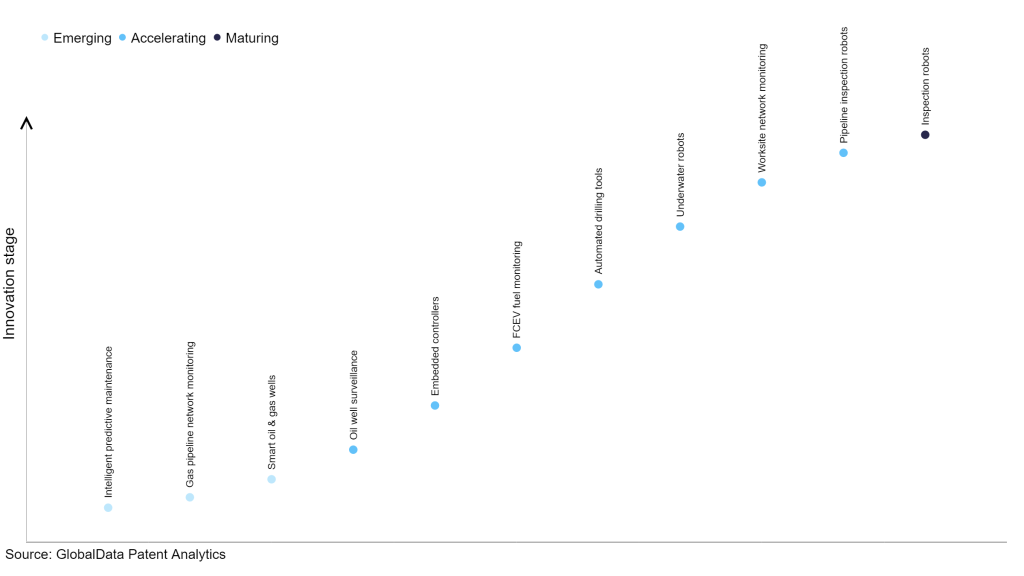The oil & gas industry continues to be a hotbed of patent innovation. Activity is driven by digitalization, analytics, and cybersecurity, and growing importance of technologies such as smart sensors, edge computing, and connected car technologies. In the last three years alone, there have been over 523,000 patents filed and granted in the oil & gas industry, according to GlobalData’s report on Internet of Things in oil & gas: FCEV fuel monitoring. Buy the report here.
However, not all innovations are equal and nor do they follow a constant upward trend. Instead, their evolution takes the form of an S-shaped curve that reflects their typical lifecycle from early emergence to accelerating adoption, before finally stabilizing and reaching maturity.
Identifying where a particular innovation is on this journey, especially those that are in the emerging and accelerating stages, is essential for understanding their current level of adoption and the likely future trajectory and impact they will have.
60+ innovations will shape the oil & gas industry
According to GlobalData’s Technology Foresights, which plots the S-curve for the oil & gas industry using innovation intensity models built on over 196,000 patents, there are 60+ innovation areas that will shape the future of the industry.
Within the emerging innovation stage, intelligent predictive maintenance, gas pipeline network monitoring, and smart oil & gas wells are disruptive technologies that are in the early stages of application and should be tracked closely. Oil well surveillance, embedded controllers, and FCEV fuel monitoring are some of the accelerating innovation areas, where adoption has been steadily increasing. Among maturing innovation areas is inspection robots, which is now well established in the industry.
Innovation S-curve for Internet of Things in the oil & gas industry

FCEV fuel monitoring is a key innovation area in Internet of Things
FCEV fuel monitoring refers to the process of monitoring and controlling the fuel supply system in a fuel cell electric vehicle (FCEV). It involves monitoring the levels of hydrogen fuel stored in the vehicle, setting off alarms when the stored fuel reaches critical levels, and managing the supply system to ensure optimal performance and efficiency.
GlobalData’s analysis also uncovers the companies at the forefront of each innovation area and assesses the potential reach and impact of their patenting activity across different applications and geographies. According to GlobalData, there are 350+ companies, spanning technology vendors, established oil & gas companies, and up-and-coming start-ups engaged in the development and application of FCEV fuel monitoring.
Key players in FCEV fuel monitoring – a disruptive innovation in the oil & gas industry
‘Application diversity’ measures the number of applications identified for each patent. It broadly splits companies into either ‘niche’ or ‘diversified’ innovators.
‘Geographic reach’ refers to the number of countries each patent is registered in. It reflects the breadth of geographic application intended, ranging from ‘global’ to ‘local’.
Patent volumes related to FCEV fuel monitoring
Source: GlobalData Patent Analytics
Toyota Motor is one of the leading patent filers in the FCEV fuel monitoring for the oil & gas industry. The company has pushed its hydrogen fueled vehicles and has developed fuel cell technologies for the same. It has established a dedicated Fuel Cell Business Group to undertake engineering, assembly and sales responsibilities. Some other key patent filers in the space include Hyundai Motorand Honda Motor.
In terms of application diversity, Nio leads the pack, while iRobot and Superpedestrian stood in the second and third positions, respectively.
By means of geographic reach, BYD held the top position, followed by iRobot and Dyson. BYD develops a variety of vehicles ranging from cars, buses and trucks, as well as offers energy storage solutions.
Efficient FCEV fuel monitoring allows for better fuel management by the vehicle drivers and appropriately scheduling refilling.
To further understand the key themes and technologies disrupting the oil & gas industry, access GlobalData’s latest thematic research report on Internet of Things in Oil & Gas.
Data Insights
From

The gold standard of business intelligence.
Blending expert knowledge with cutting-edge technology, GlobalData’s unrivalled proprietary data will enable you to decode what’s happening in your market. You can make better informed decisions and gain a future-proof advantage over your competitors.






